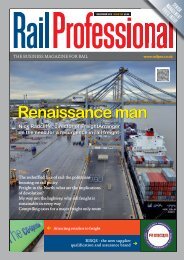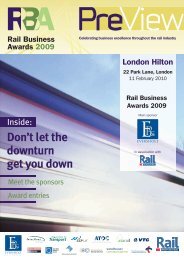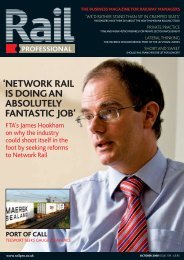View as PDF - Rail Professional
View as PDF - Rail Professional
View as PDF - Rail Professional
Create successful ePaper yourself
Turn your PDF publications into a flip-book with our unique Google optimized e-Paper software.
Legal<br />
following the prosecution: a fine which<br />
w<strong>as</strong> later upheld by the Court of Appeal.<br />
That first prosecution w<strong>as</strong> followed by<br />
Lion Steel Limited being fined £480,000 in<br />
July 2012. And in May 2012, JMW Farm<br />
Limited w<strong>as</strong> fined £187,500 after another<br />
successful prosecution under the Act.<br />
This year so far, there have been<br />
announcements of four more companies<br />
who face prosecution under the Act.<br />
In most c<strong>as</strong>es so far, though, there h<strong>as</strong><br />
been a common theme: the person who<br />
w<strong>as</strong> killed w<strong>as</strong> usually an employee and<br />
w<strong>as</strong> involved in an activity which could<br />
be considered 'inherently dangerous'.<br />
In Cotswold, a sub-standard trench<br />
collapsed. In Lion Steel, an employee<br />
fell through a roof. Of the new c<strong>as</strong>es, PS<br />
& JE Ward Limited involves the death<br />
of an employee by electric shock. MNS<br />
Mining Limited involves the death of four<br />
miners and JMW Farm Limited concerns<br />
the death off an employee at a pig farm.<br />
Another c<strong>as</strong>e involves Mobile Sweepers<br />
(Reading) Limited, where a man died from<br />
crush injuries after working on a repair<br />
underneath a road-sweeping truck.<br />
However, potentially one of the most<br />
interesting c<strong>as</strong>es is the one planned against<br />
Princes’ Sporting Club Limited. In this<br />
c<strong>as</strong>e, an 11-year-old girl died after falling<br />
off a banana boat and being hit by the<br />
speedboat towing it. This did not involve<br />
an ‘inherently dangerous’ activity and<br />
revolves around a member of the public,<br />
not an employee.<br />
The c<strong>as</strong>e is, therefore, likely to be<br />
linked closer to the traditional common<br />
law of negligence, <strong>as</strong> opposed to health<br />
and safety at work. In order to establish<br />
negligence, firstly, there must be a duty of<br />
care owed to the person who is injured or<br />
killed. Secondly, there must be a breach of<br />
that duty. Thirdly, there must be resultant<br />
damage, which, under the Corporate<br />
Manslaughter and Corporate Homicide<br />
Act, must involve a death.<br />
<strong>Rail</strong> industry in a unique position<br />
So what are the implications of the Act<br />
for the rail and other industries Firstly,<br />
the rail industry is in a fairly unique<br />
position. In that respect, the Act provides<br />
guidance on whether or not a duty of care<br />
will be owed to a particular individual.<br />
Examples of when a duty of care will exist<br />
are included in the Explanatory Notes to<br />
the Act. They include 'duties owed by a<br />
transport provider to its p<strong>as</strong>sengers'.<br />
Secondly, the size of the fines is<br />
significant. For example, Cotswold<br />
Geotechnical only employed eight people<br />
at the time of the offence. However,<br />
a substantial fine w<strong>as</strong> imposed in line<br />
with the severity of the offence. A larger<br />
organisation could face a much bigger fine.<br />
Thirdly, prosecution involving a<br />
non-employee could have applied in the<br />
instance of the rail guard mentioned at the<br />
start of the article. There are significant<br />
implications for the industry when dealing<br />
with p<strong>as</strong>sengers and members of the public<br />
generally.<br />
A fourth and final consideration is that<br />
the Act could be used to protect employees<br />
in situations where the activities are not<br />
'inherently dangerous'. For example, many<br />
employees are required to drive long<br />
distances for work. Could we perhaps see<br />
the first prosecution under the Act, where<br />
an employee is either killed or causes the<br />
death of the third party, while driving on<br />
business<br />
The Act is still very much a work in<br />
progress and it is difficult to state, with<br />
certainty, how it may apply in the future.<br />
One thing is certain, however. Ultimately<br />
all organisations need to remain vigilant to<br />
health and safety issues, adapt according to<br />
the situation and then take all re<strong>as</strong>onable<br />
steps to protect employees and third parties<br />
from injury or death.<br />
Claudia Gerrard is a legal consultant at Excello Law.<br />
You can call her on 07447 985647 or email her at<br />
cgerrard@excellolaw.co.uk<br />
Page 28 July/August 2013
















